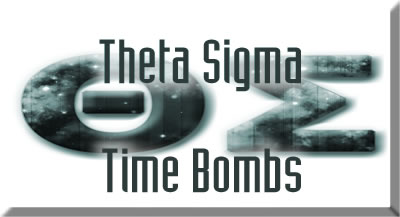
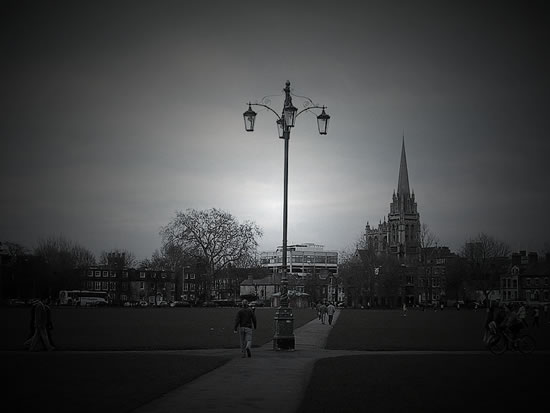
Julia sparkled in the dress Princess Cirena’s dressmaker had created for her eighteenth birthday. That was because a generous handful of diamonds were sewn into the bodice and around the hem of the calf length skirt. Another down payment on the hundreds that would be hers when she was his bride, Chrístõ said when he gave them to her. A diamond necklace adorned the flesh the carefully sculpted dress didn’t cover and she had earrings to match.
The staff at Brasserie Chez Gérard of Bridge Street, Cambridge treated all of their customers as honoured guests. Even a young woman wearing so many diamonds should not have been special. But Chrístõ had made some arrangements along with the reservation.
“Bonsoir Monsieur,” the maitre-d said with a polite bow of his head. “Et Joyeux Anniversaire mademoiselle.”
“You told them?” Julia whispered as they were shown to their seat.
“Of course. I promised you two birthdays ago that we would come back here on your eighteenth birthday and have champagne with our dinner. And as a Time Lord of Gallifrey I am duty bound to keep such promises.”
Julia laughed. When he said such things about duty he always seemed so very solemn. Of course, he did take his Time Lord honour seriously, and it was right and proper that he should. But champagne on her birthday didn’t have to be a matter of principle.
The champagne arrived in a silver ice bucket with sparklers fizzing madly and making the ice look like diamonds. Other diners paused to watch as the maitre-d popped the cork and poured the champagne. Chrístõ was offered the first glass to approve and then with as much ceremony as possible Julia’s glass was filled. She lifted it to her lips and tasted it while the diners applauded and the wine waiter wished her ‘joyeux anniversaire’.
“It’s a strange rite of passage,” Chrístõ commented as they settled down to their meal. “Being permitted to partake of a substance that causes adverse chemical reactions within the brain.”
“That’s not a very romantic description of drinking champagne,” Julia told him.
“I know,” he replied. “I’m thinking like a Time Lord. I’m over-compensating.”
“For what?” Julia asked.
“For my Human nature. You’re eighteen. You’ve been my fiancée for a year, and you look absolutely stunning in that dress.”
Julia laughed. It was all she could think of in response to such a remark.
“I love you, Chrístõ,” she assured him. “I always have. From the first day I met you, I loved you.”
“Yes, you did,” he admitted. “And I loved you.”
But that love had changed over the years. When he first brought her into his TARDIS as an eleven year old girl who had suffered unimaginable trauma, his instinct was to protect her. As she grew away from the tragedy and became a happy, well-adjusted girl, they were often mistaken for brother and sister, and that was how he loved her. Sometimes as she became a teenager, he needed to be a fatherly brake on her enthusiasm, and he had felt the age gap between them keenly. But then, at last, she began to blossom into a young woman, and the age milestones put in place by her society were passed. He was allowed to love her as his future wife.
In Human society, especially in this twenty-first century era where they were celebrating her birthday, nobody would be surprised if they had already taken their relationship to a far deeper level. Even in her twenty-fourth century society, it wouldn’t be questioned. But they had decided long ago that they would wait until she was twenty-three, the age of consent in the Earth Federation. Julia would pursue her gymnastic ambitions before coming to Gallifrey to be married to him by a grand ceremony in the Panopticon and to bear his children as befitted the wife of an Oldblood Patriarch. Their future was mapped out. Both of them were happy to wait.
All the same, there were some other ways that Julia reaching the age at which a Human girl of her era could be freely intimate with a man might be recognised, and he had made preparations for later.
“Chrístõ?” Julia spoke his name and he realised he had not been paying her attention. He blamed it on the champagne.
“Alcohol doesn’t affect you,” she told him. “You’re a Time Lord.”
“It can if I want it to,” he replied. “I can let a mellow, satisfied feeling come over me if I want. And I think I want it to, tonight.”
“So do I,” Julia admitted. “Mellow suits you. You should be mellow more often and less like a Time Lord. Not that I’m complaining. We have had a wonderful day. I enjoyed punting on the river. You looked magnificent standing there with the pole. Where did you even learn to do that?”
“On the river B?rrow when I was a boy,” Chrístõ answered. “The Dower House is beside the river. My grandfather taught me to control a punt. On summer afternoons my grandmother used to love being conveyed downriver by me. I wish you could have met my grandmother, Aineytta. She was a wonderful woman. She was an apothecary. Legend has it that she brewed a love potion to capture my grandfather’s hearts. And it must have worked. They were devoted to each other until they died.”
“I think that runs in your family. Valena told me once that your family were renowned among the Oldblood Houses for always marrying for love, not expediency.”
“Renowned?” Chrístõ smiled meaningfully.
“The word she used was ‘notorious.’ But she said it with a smile.”
“There you go, then. I have to love you with both of my hearts. Otherwise I would be letting down my ancestors.”
Julia laughed again. He was being very Gallifreyan about it. But she couldn’t complain. She loved him, all of him, including the sometimes maddening traits he got from those ancestors of his.
When the dinner was over they walked in the warm air of a summer evening. That was a bonus of loving a Time Lord. Her birthday was in February, but she celebrated it on a fine summer day. It had been glorious sunshine when they had punted on the Cam. She had carried a frilled parasol that shaded her comfortably, and they had eaten ice cream afterwards. Now, the stars were out in a clear sky and she needed only a shawl around her shoulders as they admired the uplit edifices of the great Colleges of Cambridge across the river.
“Saint Cedd’s,” Julia commented as they looked at one of the less famous Colleges, but one that had significance for them.
“I often think of the old man,” Chrístõ admitted. “His actions... they got us both into a lot of trouble. He deceived us. But I think he was courageous. And I regret we didn’t become greater friends.”
“Did Hext find out who he really was?”
“I think he did, but he wouldn’t tell me. He said it was classified, and if I tried to hack the system he would practice using those electronic whips on me, after all.” Chrístõ laughed grimly. “I considered risking it, but Hext always knows what I’m thinking. I’d never get the chance.”
“He said you would know him when you were older.”
“He said I would know him when I had a different name and different face. I can’t regenerate until I am five hundred, so no point in dwelling on it, now.”
Instead he took advantage of the quiet and the solitude and drew his fiancée into a deep, lingering kiss. He had first done that here in Cambridge two years ago to the day, and he never tired of the simple pleasure.
“Don’t lets be here at midnight, though,” Julia said. “I know nothing bad will happen this time, but I’d rather hear the chimes from the window in our hotel.”
“I agree,” Chrístõ answered. He took her by the hand and they walked back through the streets of Cambridge. They couldn’t really be described as quiet streets. There were too many clubs with late licences from where the sounds of loud, pulsating music and revelry poured out. It was a little quieter when they reached the corner where St. Andrew’s Street became Regent Street and they entered the foyer of the University Arms, a Victorian Hotel built with elegance and luxury in mind. The Regency class suite that Chrístõ had booked was a fine set of rooms, fully worthy of his aristocratic status. Julia had liked it so much she hardly wanted to leave it and spend the day in the city. Now she liked it all over again when she saw the fresh flowers all over the sitting room and in the bedroom. She showered quickly and put on a long silk nightdress and a complementary dressing gown and slippers with the hotel logo on them. When Chrístõ emerged from the en suite bathroom in his own complementary dressing gown and slippers she was sitting at the window looking out over the stretch of parkland called Parker’s Piece that was one of the selling points of the University Arms. She was eating a peach from the huge fruit basket that went with the flowers Chrístõ had splashed out on.
“The Cambridge Rules of football were developed down there on that grass,” Julia said as he came to sit next to her with a glass of brandy from the complementary bar. “They eventually became the formal rules of Association Football as played by teams like Preston North End, your favourite.”
“Yes,” he replied. “I always thought it strange that the rules were developed here among privilege and wealth, but the greatest teams were associated with working class northern towns like Preston or Manchester and Liverpool.”
“You come from privilege and wealth. It’s even stranger that you should support one of those working class teams.”
“I come from a planet two hundred and fifty million light years from here. I shouldn’t support a team at all.”
They sat by the window and talked about trivial things like that until the bells in churches and chapels and college buildings all over the city chimed midnight together. It was a magnificent gestalt sound. Julia listened happily.
“I never hear bells like that on Beta Delta,” she said. “There are only a few churches with bell towers in New Canberra. There aren’t any at all on Gallifrey.”
“If bells mean so much to you, I’ll have a clock tower with a whole peal of bells erected at Mount Lœng House,” Chrístõ told her.
“It would be cheaper and easier to bring me back to Earth now and again, so I don’t feel homesick. Here to Cambridge, or for a few summer days in the house in Parthenay, or Liverpool for the shopping...”
“Preston on match days?” Chrístõ suggested. Julia laughed but agreed that was a possibility. “We’ll do that, I promise. But I hope you’ll be happy on Gallifrey, too.”
“I’ll be happy anywhere with you.”
“Should I save my money, then, instead of booking expensive hotel suites?”
“No, I like the expensive hotel suite,” Julia assured him. “Especially one with a queen size bed for two.”
That was enough of a hint. Chrístõ smiled and took her by the hand to the bedroom. She slipped off her dressing gown and slid between the sheets. Chrístõ slid beside her and embraced her in his arms.
“You feel nice,” he told her. “This nightdress is an improvement on those flowery cotton ones. You look and feel like a grown woman. My woman.”
“Not quite,” she reminded him. Wearing a silk nightdress, with his body in satin pyjamas pressed against her was a new experience, a pleasant experience. She was enjoying it very much, but she was clear in her mind about how far she wanted it to go.
“No, not quite. But near enough to spend the night beside me like this. My mother did when she was engaged to my father. It isn’t exactly Gallifreyan tradition. Strictly speaking we should have had a chaperone present from the day we got engaged. But tradition has to change sometimes.”
“I like this new tradition,” Julia told him. “It’s good to snuggle up close to you. It feels as if we’re already married.”
Yes, it felt like that. As he had hoped. He meant no more than to hold her close to him in this soft, luxurious bed all night. But it was a crucial step forward in their long journey to their Alliance.
Julia fell asleep in his arms. He didn’t take much longer to follow her. Sleeping in the ordinary way was a rare thing for him. He preferred to send himself into a mind-clearing trance. He didn’t like the dreams he had when he slept. But he knew he wouldn’t have any bad dreams when he slept with Julia next to him.
He didn’t dream. But he woke suddenly in the grey half light of pre-dawn. There was another source of light in the room. He looked around and saw an object on the bedside table. It was the Gallifreyan puzzle box that Professor Chronotis gave Julia two years ago on her sixteenth birthday. It was glowing with silvery-white light.
Julia was sitting up in the bed, staring at the box.
“How did that get here?” Chrístõ asked. “Wasn’t it in your room on board the TARDIS?”
“Yes, it was,” she answered. “I don’t know how it got here. But that’s not the strange thing. Chrístõ... look at the clock.”
There was a digital clock with luminous numerals on the bedside table. It gave the time as 4.01 am. Sunrise would be in a little more than half an hour.
“It’s been 4.01 for ten minutes... ever since I woke up,” Julia said in a trembling voice. “Digital clocks don’t stop. Something is wrong.”
“Time is frozen,” Chrístõ told her. He could feel it in his very atoms. He was a Time Lord. He was acutely aware of the passing of time. And when it stopped, he felt as if his bones and sinew were being slowly stretched, as if that frozen time was pulling at him from every direction.
“Why?”
“Get dressed and let’s go and find out.” He found his own clothes and began to pull them on. Julia went to the bathroom to dress discreetly in a pair of jeans and a sweater and flat shoes before joining him. He picked up the puzzle box and looked into the light carefully.
“I think I understand some of it,” he said. “Come on.”
They walked downstairs, aware that the hotel was unnaturally quiet. Of course, it was early morning, but there should have been people working, still.
“Oh!” Julia gasped when she saw the night concierge sitting at the reception desk. He was frozen in his place, his hand on the telephone as if he was about to answer it. The doorman was the same. His hand was on the door ready to open it for a guest who was in the process of getting out of a taxi. Chrístõ carefully examined the concierge and the doorman.
“They’re both fine,” he assured Julia. “They’re alive, but their lives are ‘halted’ in the gap between two moments. When time snaps back they won’t know anything happened.”
“Will time snap back?”
“When we work out why it’s frozen in the first place,” he answered. He opened the door and stepped out into the cool pre-dawn. He looked at the puzzle box in his hand and then walked quickly towards the middle of Parker’s Piece. Julia hurried after him, noting that there were squirrels and birds frozen in time around the park.
“It’s telling you where to go?” she asked.
“Like a psychic compass,” he answered. He stopped and looked around. Then Julia gave a soft cry. There was somebody else there.
“You! But it can’t be. You died. Two years ago.”
“Yes, I did,” replied the shade of Professor Chronotis. It shimmered slightly, becoming transparent before solidifying again. “Two years ago to this very day. You have grown up a lot in those two years, dear girl.”
“Never mind that,” Chrístõ replied. “You shouldn’t be here. You’re a Time Lord. When your thirteenth life was over, your spirit should have flown to its resting place. You should have been at peace. I was there, beside you, to guide you...”
“You did nothing wrong. I should have gone. But there was some unfinished business. You couldn’t have known. I didn’t, until it was too late. I could only wait for you to return.... a living Time Lord who could do the necessary work. I sensed your presence. I had enough power to bring the box to you. It will serve as a guide. I can’t help you further than that. It is taking all of my psychic strength to keep time frozen while you complete the task.”
“What task?” Julia demanded. “And why should we do anything? The last time, you tricked Chrístõ into becoming the prisoner of Time. How can we trust you?”
“We can trust him,” Chrístõ assured her. “In life, he may have been capable of deceit. But as a spirit... a Time Lord spirit... he could not go against his true nature. And I believe that to be an honest nature. Tell me, Professor, what is it that must be done?”
“There are four time bombs scattered around this city. They must be retrieved, or you know what will happen.”
“I know. But HOW did they get here? Who put them here?”
“They’re tools of the Lonely Assassins,” he answered. “It’s up to you to find them, tonight, before they go critical and destroy this city and everyone in it.”
“I could locate them with my TARDIS,” Chrístõ pointed out. “But it’s at the airport. Our plan was to have an ordinary, Human holiday, without Time Lord technology. The only thing I have is my sonic screwdriver.”
“He never goes anywhere without that,” Julia pointed out.
“You cannot use your TARDIS,” Chronotis told him. “We are between time. The TARDIS is a thing OF time. You must use the puzzle box to locate the time bombs and neutralise them. And you must hurry. I can hold back time only for a little more than sixty minutes. I can give you no more than that.”
Chrístõ looked at the puzzle box and nodded. He turned and ran back towards the hotel. Julia ran after him.
“It’s about three-quarters of a mile away,” he said. “I can get there in a few minutes. Julia, you stay...”
“I’m coming with you,” she insisted. “Use those. Even you can’t run all over Cambridge with only sixty minutes.”
She pointed to a rack full of bicycles. Cambridge was the bicycle capital of Britain. There were always racks full of them for hire.
“We’re just borrowing them,” Chrístõ said as he used his sonic screwdriver to open the locks and extract two good bicycles. “We’ll get them back later.”
He mounted his ride and pushed away. Julia followed. He tore up St. Andrew’s Street, against the one way system. There was nobody to stop him. The only policeman to be seen was sitting in his car at the junction of Sidney Street and Hobson street, frozen along with the traffic light that had turned green a long moment before.
Julia wondered if Chrístõ had noticed the restaurant where she had drunk her first official champagne a few hours ago as they rode down Bridge Street and across the river at Magdalene Street. That shortly became Castle Street, and just past the old Methodist Church Chrístõ jumped off the bicycle and ran across a lawn, then an empty car park and up a low hill that Julia recognised as the location of Cambridge Castle. There had not been any kind of structure there for many centuries, but the mound where the Normans had built a motte and bailey defence of the town remained, along with a plaque and a panel with a brief history of the site. It was still there in Julia’s own time, when the panel was an interactive one with holograms of what the castle might have once looked like. In this early twenty-first century it was just an information sheet under glass to protect it from vandals.
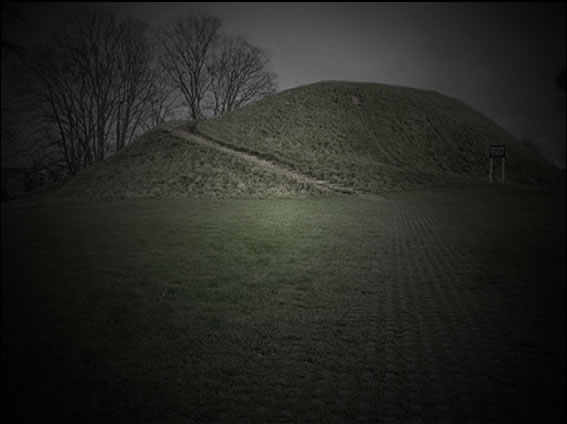
“Now what?” she asked Chrístõ. He was holding the puzzle box and turning slowly, orientating himself. Then he knelt and used the sonic screwdriver to burn away a patch of turf. He pulled it back and then dug in the soil with his hands. Julia watched him uncover something that looked like an opaque white globe with its own light source inside.
“That’s the bomb?” she asked.
“Not a time bomb as you imagine it,” Chrístõ explained. “These are left by creatures called The Lonely Assassins. What they do at first is steal time from people, a few minutes, a few hours, from the lives of victims.... they wouldn’t even know it. But when the bombs go critical... as these are ready to do, they will take all of the time, all at once. Four of them, in a city this big, so many people... all aged to death in an instant... And then the Assassins will collect the time and feed on it.”
“These Assassins...”
“They’re not our problem. They won’t be here. Not until the worst is done and they come to feast. They can’t do that while time is frozen. They belong in time, just like most creatures. The laws of physics apply differently to them, but they apply.”
“They don’t seem to be applying to us?”
“That’s his doing. Chronotis. But it most certainly is affecting us. Or me, anyway. If this lasted more than an hour, it would rip me apart. That’s another reason not to waste time.”
He placed the globe on the floor and stood back. He aimed the sonic screwdriver at it and the white light increased momentarily before it exploded noisily.
“First one neutralised,” Chrístõ said. He turned to hurry back down the hill to where they left the bicycles. He looked at the puzzle box and got a bearing on the next location.
“Roughly south of here, about two miles,” he said.
“Downhill most of the way, then,” Julia observed.
Downhill was not exactly the right word for it. Cambridge had few areas that could be called hilly. But it was a very slight decline from Castle Street back across the river and down through the city centre and it was possible to freewheel past their hotel to where the elegant sounding Regent Street became the more mundane if misnamed Hills Road. Before it crossed the railway line, Chrístõ felt the psychic compass signalling the close proximity of the second time bomb. He wheeled the bicycle towards a locked gate leading into a shadowy garden.
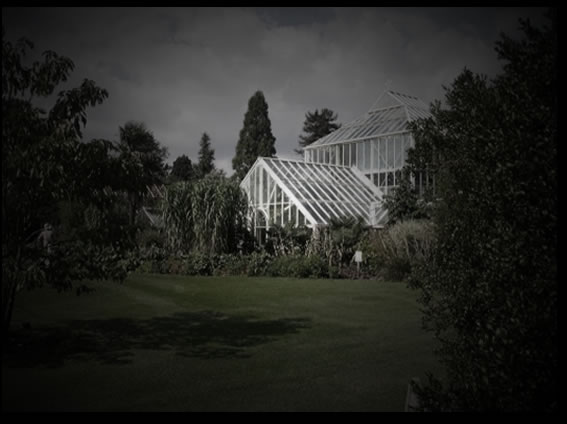
“The University Botanical Gardens,” Julia said. “We used to visit here every month when I was at school. I loved it. They had species grown from cryogenically frozen seeds that otherwise would have died out in the twenty-first century.”
“They must be collecting the seeds now for your generation to enjoy,” Chrístõ commented. “A very worthy project.” He examined the gate and decided against climbing over. The sonic screwdriver worked on the lock. They brought the bicycles with them. Chrístõ rode one handed through the botanical footpaths, steering around a night guard and his frozen watchdog. He carefully watched the puzzle box. The closer they were to the time bomb, the brighter the light was. But the Botanical Gardens had miles of paths and countless different sections of specialist plantlife. They couldn’t wander around all day.
“I was going to bring you here later today,” he said. “I thought it would be a great place for a picnic.”
“It still will be,” Julia assured him. “In the sunshine. It feels rather odd right now. So still and silent. There’s no breeze, no birds or insects. This is the scented garden here. It attracts all sorts of insects. In summer it’s full of butterflies. But like this...”
It was upsetting for her. Cambridge was her home town. It had changed only a very little in the two hundred years before she lived there in the twenty-fourth century. She had delighted in exploring familiar places. But now the familiar was made unfamiliar and sinister.
“Picnic lunch in the botanical gardens, later,” Chrístõ assured her. “Right now...”
The time bomb had to be here. He could feel it. But WHERE? He was sure it wasn’t buried in the flower beds. It felt as if it was above ground somewhere.
“Oh!” he exclaimed in a rather understated way as the compass drew him to a terra cotta planter in which a straggly tree labelled “Amyris elemifera, or Sea Torchwood”, which was apparently native to the Bahamas, managed to survive in rather less tropical Cambridge. It was probably kept in a hothouse in winter, Chrístõ thought, and set in the scented garden when the season suited it.
He aimed the sonic screwdriver at it, and the terra cotta glowed red from inside. Julia moved back nervously and was glad she did when the pot and the time bomb hidden inside exploded noisily. Pottery, remnants of the bomb, sandy compost and broken roots of the devastated torchwood tree showered Chrístõ. He brushed debris from his leather jacket and shook it out of his hair.
“Two down, two to go,” he said to Julia in a surprisingly calm voice.
“How long has it taken us, so far?” she asked as they cycled through the botanical gardens and exited at the westerly Trumpington Road entrance. “My watch is stuck on 4.01. It feels like we’ve been at it for ages.”
“A little less than half an hour,” Chrístõ said. “That’s not bad. And the next location looks no more than about two miles away. But it might take time to locate the bomb. We have no time to waste.”
The way was relatively straight and clear. Trumpington Road was a long, wide arterial road out of the city centre. It was lined for most of the way by tall trees that made it feel darker in the pre-dawn twilight. They were too anxious to find the next time bomb to be worried about what anything looked like. They kept riding as fast as they could. Chrístõ noted that there were large grain fields behind the trees. They had left the city and were in the countryside beyond it. The psychic compass told him that the time bomb was to the south-west, beyond those fields, but it would take far longer to go on foot across rough and unknown ground. They kept riding along the main road, through a satellite village that Julia said was Trumpington itself, and then a sharp right into what became Grantchester Road.
“The home of Rupert Brooke, the poet,” Chrístõ noted. “Surely the Assassins weren’t interested in literature? It must be coincidence.” He slowed the bicycle and wheeled it along a footpath beside another place where a picnic would have been nice if time was running properly and the sun was shining. It was a pond or pool where a brook had widened out either naturally or by design. Trees overhung it and there were benches placed where the view would be pleasant in all but the bitterest winter weather.
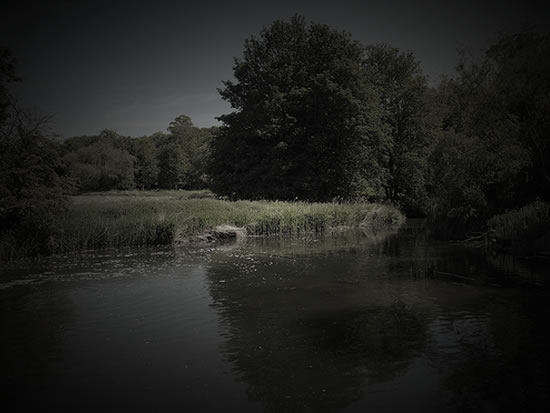
“Byron’s Pool,” Julia told him. “Local legend has it that the poet swam here. Naked, of course, because he was a poet, and a romantic, and women thought he was something.”
“Even after seeing him wet and naked?” Chrístõ replied. Julia giggled. He hoped fervently that the time bomb wasn’t in the pool or he would have to emulate the poet, a prospect that didn’t appeal to him at all.
The psychic compass drew them further down the path beside the brook and into a stand of trees. The gloomy dark was relieved by the glow of the puzzle box and the penlight mode of the sonic screwdriver. Then Chrístõ gave a sigh of relief and pointed the sonic at the bole of a wide, old oak tree. The gnarled bark began to glow. Again, Julia stepped back, but the explosion was less devastating this time. It was contained within the tree which shook alarmingly but yielding nothing worse than a shower of leaves, twigs and unripe acorns.
And one time frozen squirrel that fell from its nest above. Chrístõ caught the creature and set it gently on the ground.
“It might be a little puzzled when time unfreezes, but there’s no harm done,” Then he frowned and squinted at the puzzle box. “The next location is much further away than the last three were. It’s about four miles and we have twenty, twenty-five minutes at the most.”
They raced as fast as they could back through the satellites and suburbs of Cambridge. One part of their route was called Long Road. Chrístõ thought he might appreciate the irony later at his leisure, when this last part of his task was over.
“I think it might be at the airport,” Julia called out to him as they approached a suburban village called Cherry Hinton. “It’s up this way somewhere.”
They were near Cambridge airport, but the compass was giving Chrístõ another location. He steered the bicycle up a designated public footpath into a stand of trees and emerged next to a wide expanse of water. He was looking at it carefully when Julia gave an anguished cry behind him. He turned to see her tumble from the bicycle, having missed a tree root breaking up the path. He ran to lift her up but she moaned in pain.
“I think it’s my ankle,” she said. “It’s not broken. Just sprained.”
“I can fix it,” Chrístõ told her. “With the sonic’s tissue repair mode. But...”
“You don’t have time. Find the last time bomb. I’ll be all right. Go... go on.”
She was right. He hated to leave her sitting on the scrubby grass in pain, but there was no choice. Time was standing still for everyone else, but it was running out for him.
“Oh no!” he groaned as he caught sight of a glow in the deep, cold-looking water of what seemed to be an old quarry or chalk pit judging by the crumbling white soil around the edge. There was nothing for it but to emulate Lord Bryon after all. He kicked off his shoes and stripped down to his underwear, glad that he followed Human fashions in that regard rather than Gallifreyan, then dived in. Despite it being a balmy June night, the water was cold enough to take his breath away. But he was a Time Lord. He didn’t need to breathe for at least fifteen minutes. Long enough to dive down towards the sinister globe. He grabbed it and struck out towards the surface again. He still didn’t need to breathe. He had plenty of air left to recycle around his body. But a different panic seized him. He knew there was very little time left. It dragged at him painfully.
He broke the surface and hauled himself out of the water before throwing the globe with all his energy against the gravel path that ran along the side of the lake. It smashed in a satisfactory way. There was a brief exploding glow and then nothing. He grabbed his trousers and shirt and put them on over his wet body before returning to Julia.
“Time has restarted,” she told him as he repaired her ankle. “My watch is working. And it’s starting to get properly light at last. We did it.”
“Yes, we did.”
“You look better than Lord Byron in your underwear,” Julia teased.
“Thank you. What is this place, anyway? It had better not be another one of his swimming holes.”
“No, it’s one of mine,” Julia answered. “Burnside Chalk Pools. In my time, the whole thing is covered over by a glass roof with solar panels, and it’s a really great place to swim. Back in this time, I think its just used by anglers. There’s fish of some sort in it.”
Chrístõ made some kind of slightly grumpy and unintelligible response then he gathered his shoes and his leather jacket and made himself look a little more presentable. The prospect of a three mile cycle back to the hotel, especially now the traffic was moving and it was almost dawn did not thrill him.
We’ll go up to the airport and collect the TARDIS,” he said. “We can bring the bicycles back and talk to Chronotis before sunrise. There are things that need to be said.”
“Time Lord things?”
“Mostly.”
The TARDIS must have been displaying something of its semi-sentient sense of humour. It set down in the middle of Parker’s Piece, a field without even a duck pond on it, disguised as a bathing hut. Chrístõ gave it a friendly kick and then turned to see Chronotis waiting for him.
“You’re fading a bit,” Julia told him.
“Yes, I am. Like Hamlet’s ghost, sunrise has an effect on me.”
“You don’t need to be here for it,” Chrístõ said. “Your work is done, now.” He held the puzzle box in his hand, still. It was glowing again, this time with the actinic, sparking orange of artron energy. “Time to go to the resting place of all Time Lords, professor.”
“Yes, it is. Farewell, Son of Lœngbærrow. Farewell, gentle Child of Earth.”
Chronotis didn’t fade further. Instead, his shade rose up from the ground. He hovered over them for a few seconds before rising higher. Julia and Chrístõ stood in silence as he vanished and the sun rose over Cambridge at long last. Then they turned and wheeled the bicycles back to the stand they took them from.
“Where has he gone?” Julia asked. “What is the resting place of all Time Lords?”
“It’s called SangC’lune,” Chrístõ answered. “A dominion planet of Gallifrey. Reputed to be very beautiful. On a huge plain there are thousands upon thousands of pyramids. They contain the used lives of Time Lords. While the Time Lord is still alive, the pyramids are white, but when all thirteen lives are used, it turns black. The essence of the thirteen lives remains within the pyramid, in perfect peace for eternity.”
“You’ve been there?”
“No. I wouldn’t be allowed. Only senior cardinals and our spiritual men, like Maestro, ever go there to perform special rituals. Ordinary Time Lords never see it – at least not in their lifetimes. It must be amazing, though. The past lives of all my ancestors, of great men like Li Tuo, and Professor Chronotis, whatever his true name is... in their pyramids.”
“Well, if you have to be dead to go there, you’ve got a long wait.”
“Yes, I have. And it’s not going to be today. I think we need a few more hours sleep, then breakfast in bed and then that picnic at the Botanical Gardens in the sunshine. And we’ll take a taxi there. I’m tired of cycling.”
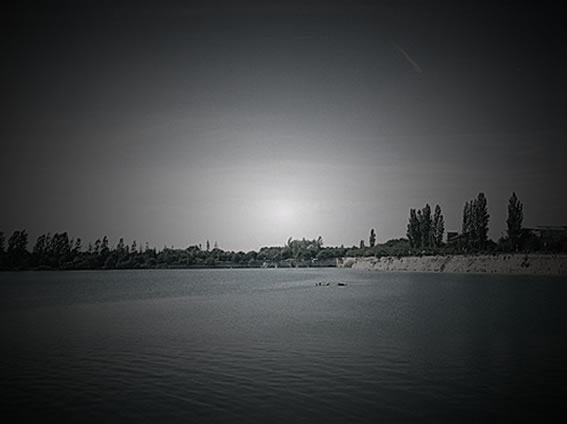
 |
 |
 |